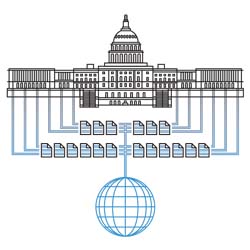Interested in learning more about open data? If you’re in the D.C. area, register for our free open data training on September 16th. We’ll have speakers from Commerce, GSA, DoT and more, who will tell you the most important things you need to know about open data at your agency.
For years, data advocates have championed open data initiatives to create more efficient government and economic opportunities. They argued that through open data, government could support emerging markets rather than create additional expensive public programs. And as our most recent GovLoop guide shows, that vision is coming to life (click here to access the report: Capitalizing on the Open Data Revolution).
Take the case of Trulia, an online residential real estate website for homebuyers, sellers, renters and real estate professionals. Trulia has a feature that creates a visualization to allow users to calculate commute times and view property values, home values, rental prices, schools, points of interest, natural hazards and crime data all in one spot and all based on public data. To create this service, Trulia pulled data from the U.S. Geological Survey and the Federal Emergency Management Agency. Trulia is a good example of how government can create information ecosystems that facilitate innovation across all sectors.
The open data landscape is quickly changing, and one way agencies can be ready for the changes is to learn best practices from public-sector open data pioneers. That’s why in this guide we explore the groundbreaking work of the Food and Drug Administration, Commerce and Data.gov. In this guide, you’ll find case studies on how each agency has taken advantage of open data to power a variety of initiatives:
- The Food and Drug Administration’s openFDA initiative makes FDA’s data publicly available and accessible in structured, computer-readable formats that make it easy for developers to build mobile and web applications and data visualizations for researchers to quickly pull FDA data through application programming interfaces. APIs are used to create a set of definitions that dictate the ways one piece of computer software communicates with another. You’ll learn from Sean Herron, product and software engineer at 18F, a new technology hub inside the General Services Administration, about the power of working with your user community to be sure that the data released is useful and valuable.
- Commerce’s International Trade Administration recently launched a Developer Portal called developer.trade.gov. This site gives software developers access to data on U.S. exports and international trade through APIs. In this case study, Mike Kruger, director of digital engagement at Commerce, will provide you with an understanding of how to collaborate on open data initiatives across an agency and with industry.
- EMC Isilon’s chief technology officer for the federal market, Audie Hittle, will explain technology’s role in powering open data initiatives. He provides intriguing case studies from the Centers for Medicare and Medicaid and Walter Reed National Military Medical Center and the work that EMC has done to support open data programs governmentwide.
- The Data.gov program continues to power innovations inside and outside government. In our final case study, you’ll learn from Jeanne Holm, Data.gov evangelist, about the outlook of open data. She also gives an update on Data.gov’s transformative work.
From Trulia to our government case studies, it’s clear that open data has reached a tipping point – a fact we also see from our GovLoop survey of 208 public-sector workers. The survey found that more than 50 percent of respondents believe that open data collaboration is mission-critical or very important. Additionally, 51 percent believe that transparency and accountability are driving their agency to adopt open data practices.
“Data should be freely shared with those who can benefit from it to improve efficiency, productivity, collaboration, responsiveness, accountability, while decreasing cost and minimizing the obstacle in achieving desired result,” a survey respondent said.
Today, government officials must think about how data can help them make decisions that uplift communities, empower citizens to take action, and create more efficient and effective agencies. Whether it is Commerce, Data.gov or FDA, we are now witnessing a philosophical shift in how public-sector officials think about their high-value and authoritative data. Our guide will help you to:
- Understand how to drive action from your open data programs.
- Identify ways in which government has excelled with open data.
- Promote case studies from leading agencies adopting open data.
Welcome to a new era, where government is an enabler of new services, and not just the provider. Now’s the time to learn how open data can empower your agency. Explore our guide to learn more.
 |
EMC Corporation, a global IT leader, enables the federal government to transform its operations and deliver IT as a service. Fundamental to this transformation is cloud computing. Through innovative products and services, delivered in partnership with leading government contractors and federal systems integrators, EMC accelerates the journey to cloud computing, helping federal IT departments to store, manage, protect, and analyze their most valuable asset—information—in a more agile, trusted, and cost-efficient way. Learn more at: https://www.govloop.com/page/emc
|





Leave a Reply
You must be logged in to post a comment.